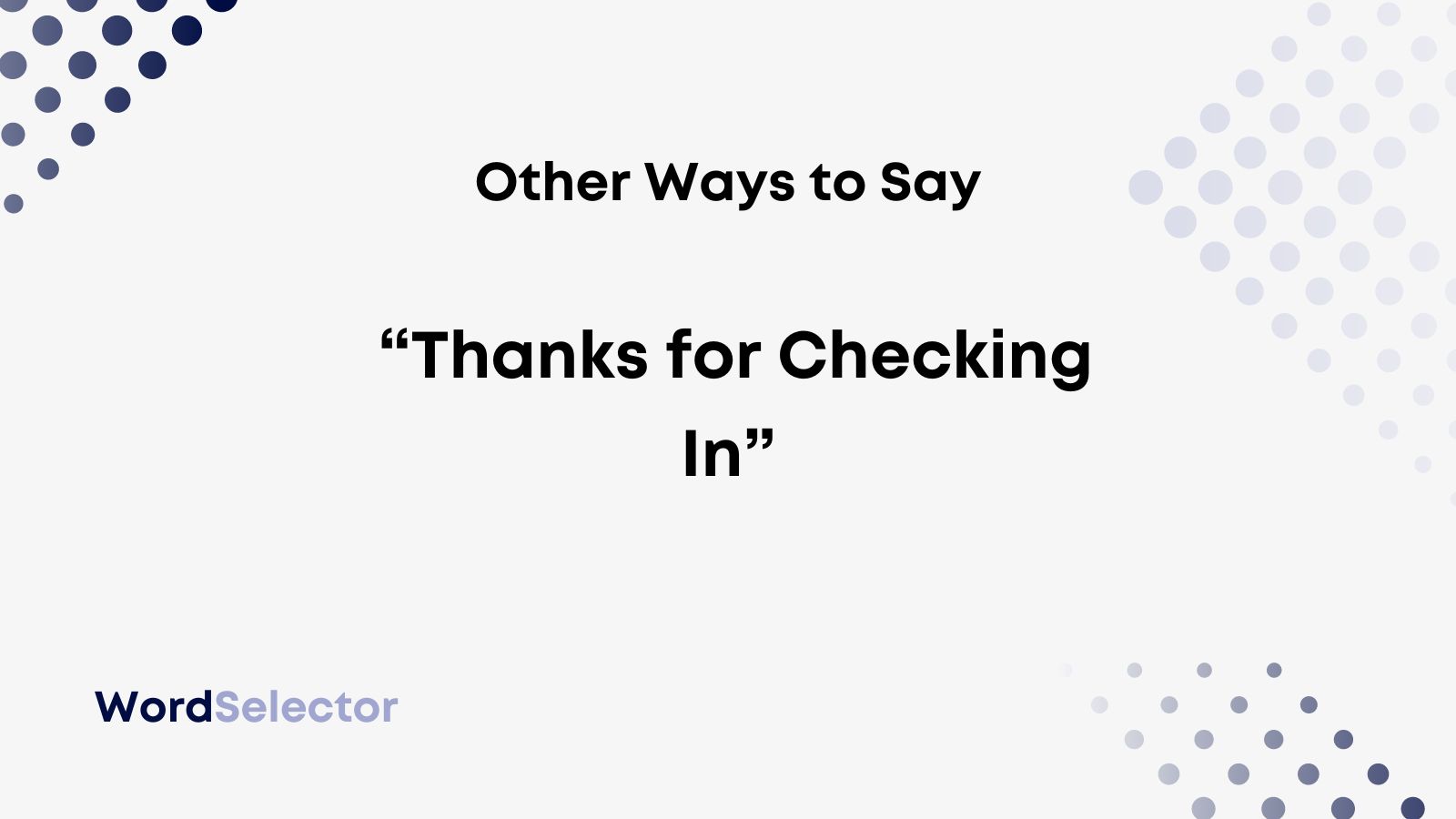Are you hoping to find out how to thank someone for checking in? You’ve come to the right place.
This article has all the answers you could need. We’ve gathered the best synonyms to explore another way to say “thanks for checking in.”
Other Ways to Say “Thanks for Checking In”
- I appreciate your email/message
- It’s nice of you to ask how I am
- Thank you for your concern
- Thanks for seeing how I’m doing
- I’m glad I have you as a friend
- Thanks for being a friend
- I appreciate you checking in
- I appreciate you coming to me
- It’s so touching that you checked in
- I’m glad you asked me how I was feeling
- Thanks for not leaving me behind
KEY TAKEAWAYS
- “Thanks for checking in” is correct and acceptable when replying to someone’s email.
- You can say “I appreciate your email/message” in professional contexts to mix things up.
- “It’s nice of you to ask how I am” is a good choice if you want to sound more conversational.
Keep reading to learn more about the best synonyms to use. We’ve explained the most useful ones in formal and informal contexts.
Also, you can learn more about “thanks for checking in” in the final section. If you want to know whether it’s acceptable, you know where to go.
I Appreciate Your Email/Message (Formal)
“I appreciate your email/message” is a great formal alternative. It works in two situations, making it a versatile choice when you want to sound respectful and polite.
The first works as an email. You can say “I appreciate your email” when emailing your boss if they’ve checked in on you. It shows you appreciate them for finding out whether you’re okay and if there’s anything they can do to help.
The second works as a message. You might text a colleague or employee when you want to let them know you’re okay. “I appreciate your message” works best when messaging someone directly in professional settings.
You can use “I appreciate your email/message” and “thanks for checking in” in similar situations. Both are effective. So, feel free to switch between them to mix up your choices in formal writing.
Here are some examples to help you:
Dear Clara,
I appreciate your email, and I want to tell you that I’m okay. Is there anything I can do for you?
All the best,
Jon
Good evening, Martin. Of course, I appreciate your message, but I’m doing much better now.
It’s Nice of You to Ask How I Am (Informal)
“It’s nice of you to ask how I am” is a great informal alternative. You can use it when showing appreciation for someone in a friendly way.
For instance, you might use it when speaking with colleagues. It shows you are flattered that they’ve checked to see how you are, especially if you’re going through a challenging time.
Generally, “it’s nice of you to ask how I am” works best as a message rather than in an email. It’s a bit too conversational to work in most professional emails.
So, you should stick with “thanks for checking in” in emails. It’s more formal, allowing you to sound more respectful. However, “it’s nice of you to ask how I am” is certainly a good choice if you want to be more casual.
Here are a few examples to help you:
It’s nice of you to ask how I am. Nobody else has come to my aid, so I’m glad you’re a true friend.
Well, it’s nice of you to ask how I am, even though nobody else did! I’ll remember that for next time.
Is It Correct to Say “Thanks for Checking In”?
“Thanks for checking in” is correct and acceptable in most cases. You can use it when someone has asked how you’re doing, especially after something bad that might have happened.
Sometimes, you might see the following phrase:
- Thanks for checking up on me.
“Up” and “in” are fairly similar in terms of meaning. However, “checking up” is informal, while “checking in” sounds slightly more formal.
Here are some other variations you can use:
- Thanks for checking in on me
- Thanks for checking in with me
- Thank you for checking on me
Adding “on me” or “with me” doesn’t change much about the meaning. However, it makes the phrase slightly more personal.
You can also remove “in” from “checking in” entirely. “Checking on me” already works well, where “on” becomes the main preposition.
You can also bookmark this page to remind yourself of the best synonyms. Then, you’ll have plenty of options to mix things up in your writing when you want to.

